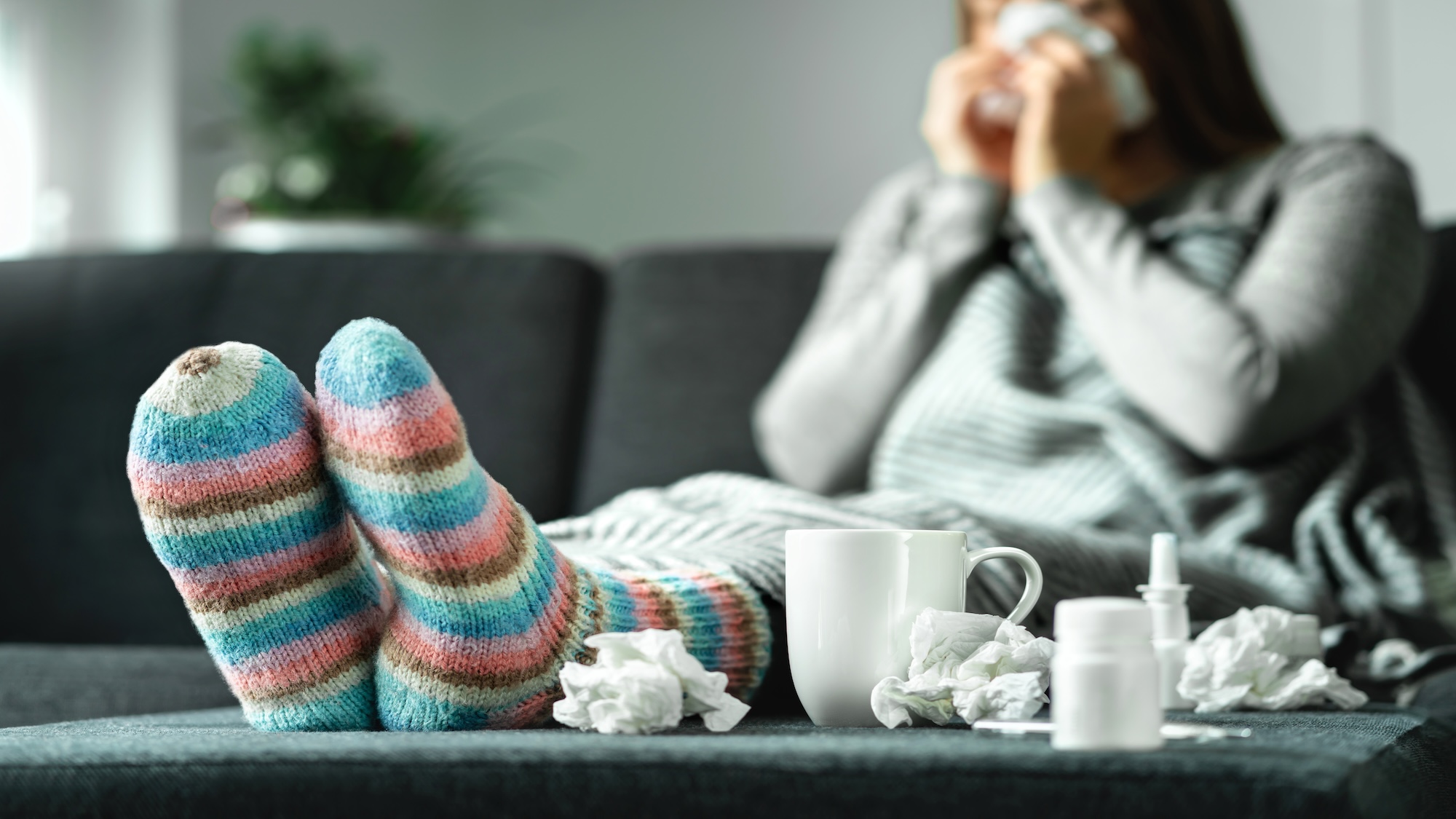5 tips for getting through the cold and flu season
You can do a few things to keep respiratory infections at bay this fall and winter.


A free daily email with the biggest news stories of the day – and the best features from TheWeek.com
You are now subscribed
Your newsletter sign-up was successful
Frigid weather has begun creeping up as we head into the fall and winter months, so it's time to start gearing up for peak cold and flu season. While it is possible to catch a virus or a common cold at any time, the number of infections tends to spike as the calendar nears its end. The Centers for Disease Control and Prevention predicts that this coming season will have a similar hospitalization rate as last year. The number of hospitalizations is expected to remain higher than before the Covid-19 pandemic, "when severe disease was caused primarily by the influenza virus and the respiratory syncytial virus (RSV)," the CDC noted. Here are some tips for navigating the upcoming respiratory disease season.
Get vaccinated
Vaccination remains the top recommendation for preventative measures during peak respiratory illness season. Getting a jab is crucial for "those who are at higher risk of developing severe complications, including older Americans and those with medical conditions," per the CDC. This season, updated Covid-19 and flu vaccines are recommended for people six months or older. Regarding RSV, there is a vaccine for pregnant people and the elderly as well as preventative shots for newborns. The CDC noted that this fall will be the "first time in U.S. history" that a vaccine is available for all three respiratory viruses. "Higher levels of vaccination across the population will also help reduce the number of hospitalizations and risk of hospital strain," the organization added.
Wash your hands and keep them off your face
Perhaps the most straightforward tip for preventing the spread of respiratory germs is to routinely wash your hands. Washing your hands is most effective if you do it correctly with soap and water for at least 20 seconds. "You will keep yourself healthier by doing so, and you will also reduce the chances that you pass your germs on to others," Kristina Duda, RN, a disease and infection prevention specialist, wrote for Very Well. The CDC recommends washing your hands before and after food preparation, eating and using the restroom, changing diapers and touching animals or garbage. You should also cover your mouth and nose when sneezing or coughing. "Flu viruses spread mainly by droplets made when people with flu cough, sneeze, or talk," the CDC explained. It's also important to avoid touching your eyes, ears or mouth because that's another easy way to spread germs.
The Week
Escape your echo chamber. Get the facts behind the news, plus analysis from multiple perspectives.

Sign up for The Week's Free Newsletters
From our morning news briefing to a weekly Good News Newsletter, get the best of The Week delivered directly to your inbox.
From our morning news briefing to a weekly Good News Newsletter, get the best of The Week delivered directly to your inbox.
Keep your body healthy to support your immune system
Keeping your body in top shape with healthy habits helps to keep your immune system working at its best. As your body's primary line of defense against germs and viruses, taking care of yourself by boosting your immune system would be most beneficial. Maintaining a healthy diet, exercising, sleeping regularly, and keeping stress at bay "help ensure that your body is better able to fight off infections," Duda further advised on Very Well. Staying hydrated is also paramount, though the amount you should drink "will vary by climate, exertion and other factors," she added.
Keep a clean environment
It's best to avoid any prolonged contact with anyone who might be sick, but in some cases, people could contaminate common areas before showing any symptoms. That's why it is best to clean and disinfect surfaces that people frequently touch in your home, at work or in school. It is also recommended to avoid sharing food and drinks to limit the risk of germs spreading from one person to another.
Self-manage symptoms if you start feeling sick
If you start feeling sick, you should stay home to tend to the symptoms. "For most people, respiratory illnesses can be treated at home," the Mayo Clinic Health System wrote. Unless you are considered 'high-risk,' you most likely don't need to seek testing or treatment from a health professional. Getting enough rest, staying hydrated and using over-the-counter meds could help soothe symptoms such as a sore throat, fatigue, cough or congestion. If you are at higher risk for severe respiratory illness, then it is best that you seek clinic-based tests or treatment. People who are immunocompromised, pregnant, age 65 or older or have other complex health issues typically have a higher risk of severe infection.
A free daily email with the biggest news stories of the day – and the best features from TheWeek.com
Theara Coleman has worked as a staff writer at The Week since September 2022. She frequently writes about technology, education, literature and general news. She was previously a contributing writer and assistant editor at Honeysuckle Magazine, where she covered racial politics and cannabis industry news.
-
 Political cartoons for February 10
Political cartoons for February 10Cartoons Tuesday's political cartoons include halftime hate, the America First Games, and Cupid's woe
-
 Why is Prince William in Saudi Arabia?
Why is Prince William in Saudi Arabia?Today’s Big Question Government requested royal visit to boost trade and ties with Middle East powerhouse, but critics balk at kingdom’s human rights record
-
 Wuthering Heights: ‘wildly fun’ reinvention of the classic novel lacks depth
Wuthering Heights: ‘wildly fun’ reinvention of the classic novel lacks depthTalking Point Emerald Fennell splits the critics with her sizzling spin on Emily Brontë’s gothic tale
-
 Stopping GLP-1s raises complicated questions for pregnancy
Stopping GLP-1s raises complicated questions for pregnancyThe Explainer Stopping the medication could be risky during pregnancy, but there is more to the story to be uncovered
-
 RFK Jr. sets his sights on linking antidepressants to mass violence
RFK Jr. sets his sights on linking antidepressants to mass violenceThe Explainer The health secretary’s crusade to Make America Healthy Again has vital mental health medications on the agenda
-
 Nitazene is quietly increasing opioid deaths
Nitazene is quietly increasing opioid deathsThe explainer The drug is usually consumed accidentally
-
 The plant-based portfolio diet invests in your heart’s health
The plant-based portfolio diet invests in your heart’s healthThe Explainer Its guidelines are flexible and vegan-friendly
-
 More women are using more testosterone despite limited research
More women are using more testosterone despite limited researchThe explainer There is no FDA-approved testosterone product for women
-
 Doctors sound the alarm about insurance company ‘downcoding’
Doctors sound the alarm about insurance company ‘downcoding’The Explainer ‘It’s blatantly disrespectful,’ one doctor said
-
 Kissing bug disease has a growing presence in the US
Kissing bug disease has a growing presence in the USThe explainer The disease has yielded a steady stream of cases in the last 10 years
-
 Private equity firms might be causing more deaths in hospital ERs
Private equity firms might be causing more deaths in hospital ERsThe Explainer Deaths in ERs purchased by private equity firms rose 13%
